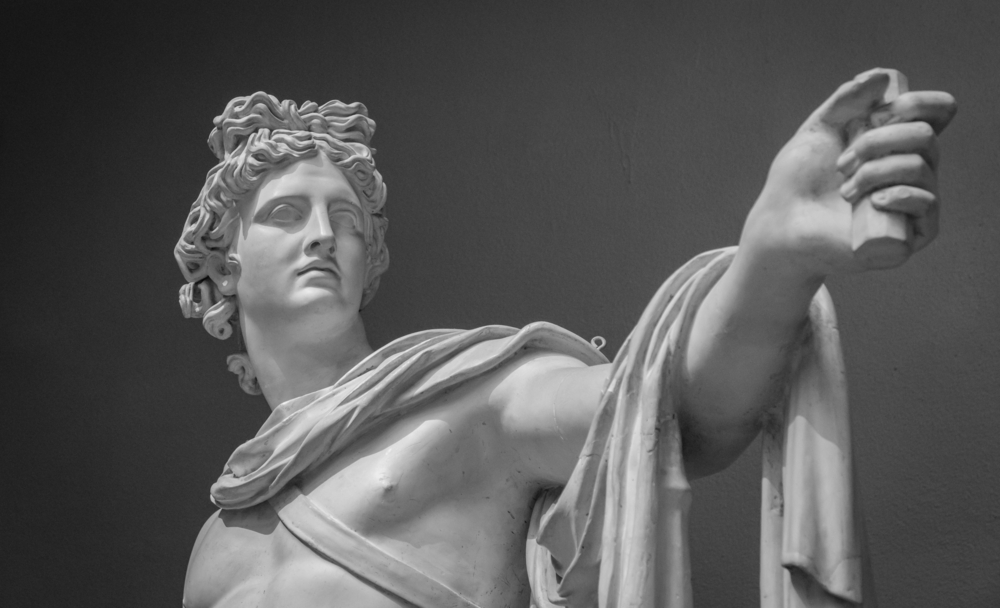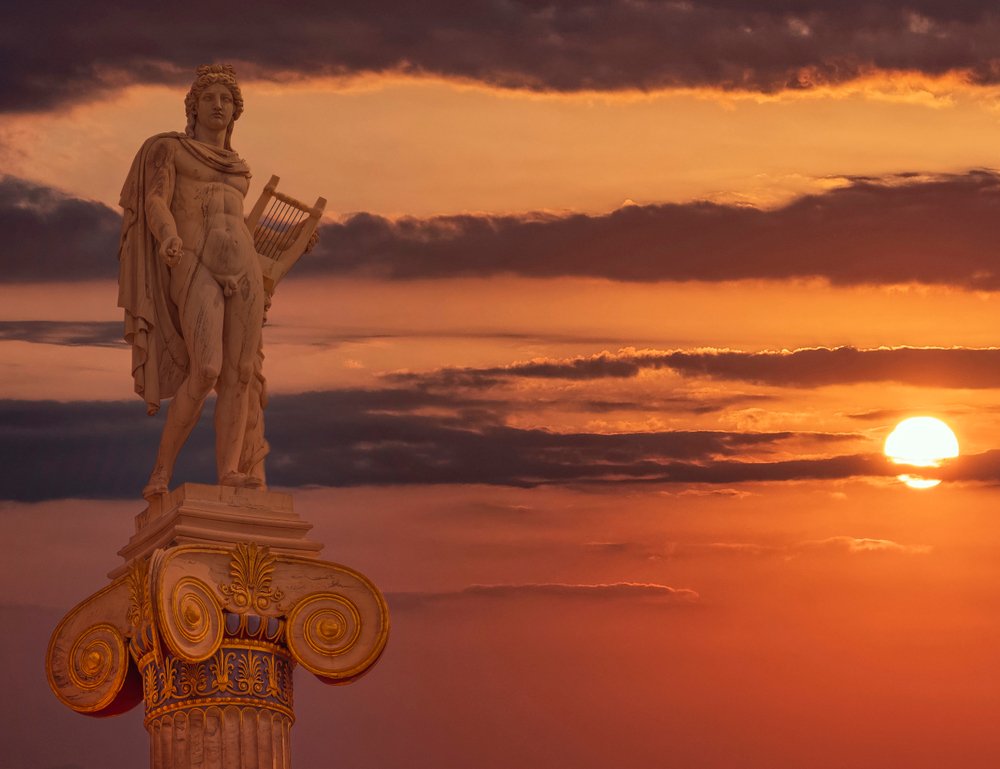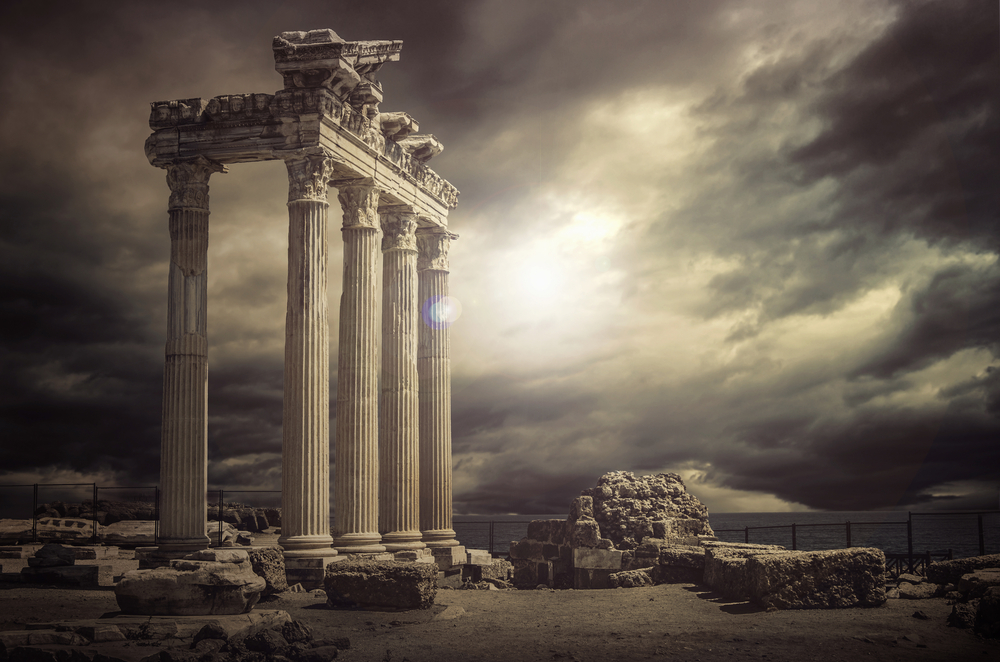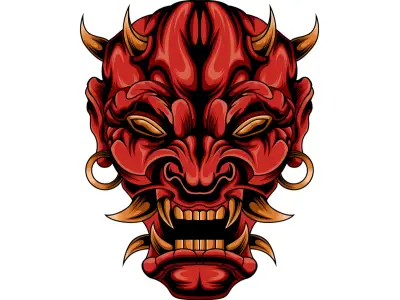Apollo, a name that resonates with ancient Greek mythology, is a figure shrouded in myth, legend, and power. Representing the arts, prophecy, healing, and the sun, this Olympian deity has fascinated historians, scholars, and enthusiasts for centuries.
If you've ever been intrigued by Greek mythology, Apollo's story is a compelling chapter you won't want to miss. Let's dive into the stories of this magnificent god, exploring his origins, myths, and symbolism.
Jump to:
Who is Apollo?

Apollo, a central figure in Greek mythology, is known for his powerful influence on the Olympian gods. Born to Zeus, the king of the gods, and Leto, a Titaness, Apollo's birth is a tale of resilience and brilliance. Despite Hera's jealousy hindering Leto from finding a place to give birth, the floating island of Delos provided sanctuary. From his first moments, Apollo was destined to shine bright, embodying beauty, strength, and divine prowess.
Apollo’s Powers
Apollo's powers each reflect an area of his influence and power in the ancient world:
- God of the Sun: Apollo illuminates the world, guiding humanity with light and truth.
- Patron of Music: His association with the lyre underscores his deep connection to music and the arts.
- Master of Poetry and Art: Apollo's influence extends to creative expression and beauty.
- Guardian of Oracles: Known for his prophetic powers, Apollo speaks through oracles, offering foresight and wisdom.
- Deity of Archery: His skill with the bow symbolises precision and focus.
- Bringer of Plague and Healer: Apollo has the power to bring disease or grant healing, showcasing his dual nature.
- God of Knowledge: His domain includes the pursuit of wisdom and the spread of knowledge.
Apollo’s Symbols

Exploring Apollo's symbols reveals much about his character and the aspects of life he influences:
- The Lyre: A symbol of his power over music and the arts, the lyre represents Apollo's essence as a bringer of harmony.
- Laurel Wreath: Representing victory, purity, and scholarly achievement, this symbol is closely associated with Apollo's favour and protection.
- The Sun: Revealing his domain over light and truth, the sun is a powerful symbol of Apollo's illuminating presence in the world.
Myths and Stories of Apollo
The mythology surrounding Apollo is rich with tales of triumph, love, and vengeance. His stories offer deep insights into the human and divine experiences:
Apollo's Birth on Delos
The tale of Apollo's birth is one of resilience and divine interplay. Leto, his mother, found refuge on the island of Delos to give birth to Apollo and his twin sister, Artemis, despite Hera's jealousy. This story reveals the protective love of a mother and the destined greatness of Apollo from his very first moments of life.
The Slaying of Python
Apollo's slaying of Python, a menacing serpent guarding the oracle at Delphi, is a testament to his bravery and strength. By killing Python, Apollo claimed the sacred oracle for himself, establishing his role as the god of prophecy. This act also led to the inception of the Pythian Games, celebrating the triumph of light over darkness.
Romantic Pursuits and Tragedies
Apollo's love life is filled with tales of beauty, passion, and often, heartbreak. The story of Daphne, who transformed into a laurel tree to escape Apollo's advances, symbolises unrequited love and the sacrifices made in the name of freedom. Meanwhile, the tragic love story with Hyacinthus, who died only to be immortalised by Apollo as a flower, illustrates the depth of Apollo's love and the vulnerabilities even gods can possess.
Apollo's Relationships and Family Tree
Apollo's interactions with deities and mortals are as complex as they are fascinating. This section explores the key figures in Apollo's life, shedding light on the dynamics of divine relationships.
Apollo's Divine Lineage
- Zeus and Leto: Apollo's father is Zeus, the king of the gods, making him a part of the most powerful lineage among the Olympians. His mother, Leto, a Titaness, is a figure of endurance and motherhood, qualities that Apollo inherits and embodies.
- Artemis: His twin sister, Artemis, the goddess of the hunt and the moon, shares a close bond with Apollo. Their complementary domains of the sun and moon symbolise balance and harmony, reflecting their deep connection and mutual respect.
Key Relationships and Offspring
- Asclepius: One of Apollo's most famous sons, born to the mortal woman Coronis, Asclepius embodies his father's healing aspect, becoming the god of medicine and healing. This illustrates Apollo's nurturing and protective nature towards his offspring.
- Orpheus: A legendary musician and poet, Orpheus is said to be the son of Apollo and the muse Calliope. Orpheus's mastery of music and tragic love story echo Apollo's domain over the arts and his complex romantic quests.
Notable Romantic Pursuits
- Daphne: Apollo's unrequited love for Daphne, who transformed into a laurel tree to escape his advances, highlights the themes of love, loss, and eternal pursuit in his mythology.
- Hyacinthus: The tragic tale of Hyacinthus, a beautiful Spartan prince whom Apollo loved deeply, ends in sorrow as Hyacinthus dies, accidentally struck by a discus thrown by Apollo. The flower that grows from his blood, the hyacinth, serves as a symbol of Apollo's grief and love.
- Cassandra: Apollo promised Cassandra the gift of prophecy in exchange for her love, but she later rejected him. In response, Apollo cursed her so that while she would always speak true prophecies, she would never be believed. This story reflects Apollo's complex interactions with mortals and the consequences of spurned love.
Apollo's Role as a Brother and Mentor
Apollo's relationships with his siblings, especially with Artemis, and his role as a mentor to figures like Asclepius, highlight his protective and nurturing sides. These relationships underscore the multifaceted nature of Apollo.
Apollo's Influence and Legacy

Apollo's legacy is seen in the arts, literature, and culture, extending far beyond the ancient Greek world. As a patron of music and poetry, Apollo inspired countless works of art and literature, embodying the ideal of harmony and beauty. His oracular shrine at Delphi was considered the centre of the world, where his priestess, the Pythia, delivered prophecies that shaped the course of Greek history and mythology.
The legends of Apollo also delve into deeper themes of human experience, such as the pursuit of beauty and truth, the complexities of love and loss, and the quest for knowledge. These themes resonate with the human spirit, making Apollo's myths as relevant today as they were in ancient times.
Apollo in Modern Times
Today, Apollo's influence can be seen in various aspects of culture and society, from names of space missions to literary references and beyond. His enduring appeal lies in his complexity as a deity of light and music, a bringer of plague and healer, embodying the dualities of human existence. Apollo remains a symbol of the quest for knowledge and the beauty of the arts, inspiring people across generations to seek harmony and enlightenment.
Frequently Asked Questions About Apollo in Mythology
Was Apollo Ever Defeated in Mythology?
While Apollo is depicted as a powerful and almost invincible god, there are stories where he faces challenges or even temporary setbacks. For example, in the Iliad, Apollo is shown to have conflicts with other gods and even mortals, though these are not typically depicted as outright defeats but rather strategic withdrawals or divine disagreements.
How Did Apollo Communicate With Mortals?
Apollo was known for his oracular powers, most famously through the Oracle of Delphi. Mortals would come to the oracle seeking answers, and Apollo would communicate through the Pythia, a priestess who served as his mouthpiece. The messages often came in cryptic or poetic forms, requiring interpretation.
What Role Did Apollo Play in the Trojan War?
Apollo played a significant role in the Trojan War, siding with the Trojans. He sent a plague to the Greek camp as retribution for Agamemnon's insult to one of his priests. Apollo also protected Hector, the Trojan hero, until his fate was to fall.
Did Apollo Have Any Enemies?
Despite his vast powers and generally kind nature, Apollo had conflicts with gods and mortals. One notable enemy was the Python, a serpentine creature that Apollo defeated to establish his temple at Delphi. Hera, jealous of Leto, also posed significant challenges to Apollo and his twin sister, Artemis, even before their births.
What Are Lesser-Known Powers of Apollo?
Beyond his well-documented powers over the sun, prophecy, and music, Apollo also had the ability to cleanse and purify, both physically and spiritually. This aspect ties into his role as a healer, demonstrating his capacity to protect and care for the well-being of both gods and mortals.
Recommended for you!
Best SellersExplore Apollo’s Legacy with Centre of Excellence
Take a captivating journey through ancient myths and legends with our Greek Mythology Diploma Course, crafted to bring the tales of Apollo and the Greek gods to life.
Why Centre of Excellence?
- Accessibility: We firmly believe in the transformative power of education for everyone. To honour this, we've made our courses affordable, ensuring that learning about the rich world of Greek mythology is accessible to all.
- Flexibility: Our courses are designed with your life in mind. Learn about Apollo, his myths, and the ancient gods at your own pace, from anywhere in the world. This flexibility allows you to weave your quest for knowledge seamlessly into your daily life.
- Supportive Learning Environment: Joining our course means gaining access to dedicated tutor support and becoming part of a vibrant community of fellow mythology enthusiasts.
Special Offer
We are excited to offer you the Greek Mythology Diploma Course at an exclusive discounted rate of £29, saving you over £100!












